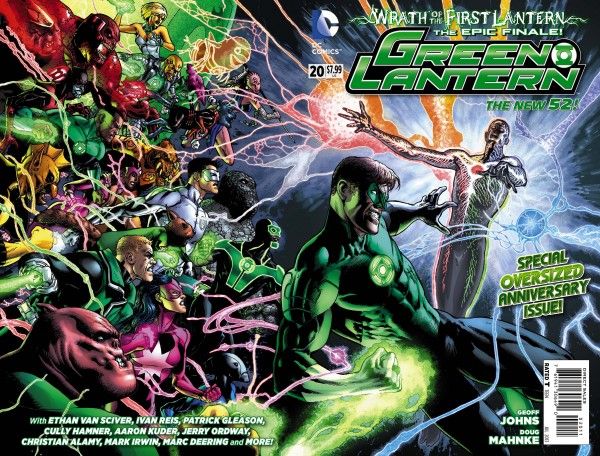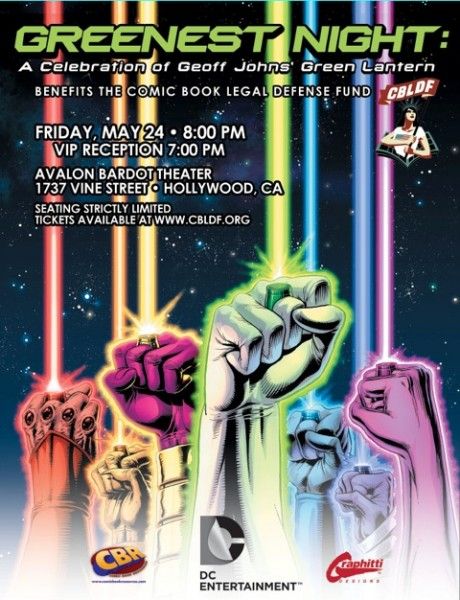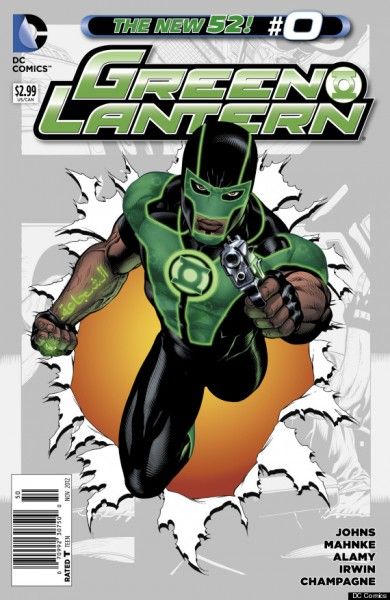Collider was recently invited to attend a special event, held at the Avalon Bardot Theater in Hollywood, celebrating the creativity of Geoff Johns and benefitting the Comic Book Legal Defense Fund, which is dedicated to the protection of the First Amendment rights of the comics art form and its community of retailers, creators, publishers, librarians, and readers. The purpose of the evening was to recognize Johns’ work on Green Lantern, that started in 2004 with Green Lantern: Rebirth, reintroducing Hal Jordan to the DC Comics Universe and beginning a journey that would make the series one of the most exciting and best-selling franchises in the comics industry. After nearly a decade of work, Johns now concludes that run with Green Lantern #20, leaving the franchise with hundreds of new characters and worlds that will be explored for generations to come.
During the event, Geoff Johns sat down for an intimate Q&A, in which he talked about bringing back Hal Jordan, escaping the typical comic book trappings, the mixed emotions he felt while finishing Issue 20, what it was like to start getting the finished pages back, how he decided where and when this story would end, the reaction he got from DC when he finally told them, what he discovered about himself while writing the story, creating the first Arab-American Green Lantern, and when he doubts himself, as a writer. He also talked about his time working for director/producer Richard Donner, and the time he wrecked one of his cars. Check out what he had to say after the jump.
Question: When you think back to the initial reaction that you’d be bringing back Hal Jordan, how do you feel about what you’ve done with Green Lantern now?
GEOFF JOHNS: Bringing back Hal Jordan was considered a risky move, which sounds weird now. People were like, “Why are you going to do that?” I heard the same thing when I did Teen Titans, a year earlier. People were like, “It’s going to get canceled in six months. Why are you going to waste your time on that?” And I heard it again when people said, “Why are you going to waste your time on JSA? Why are you going to waste your time on Aquaman?” I think I’ve heard that for most of my career. But, I really was excited about Green Lantern. Hal Jordan had been gone for 10 years, so there were a lot of questions about, “Is this really going to work? How can you do this?” I like skepticism. I thrive off of challenges like that. I love Batman and Superman, but people love Batman and Superman already. I really like taking characters that people underestimate, and Green Lantern was probably at the top of that list, for me.
Why do you feel that you’ve been able to escape the typical comic book trappings?
JOHNS: I don’t know. I love every character in the DC universe, except for Rampage. Rampage is a She-Hulk rip-off, and I like She-Hulk. But, I’ve always been attracted to the characters that I didn’t know anything about. If you do anything in life with passion and love, then it’s worth trying. You don’t hit home runs every time, but there’s no character in DC that I won’t try. I think there’s potential in all of these concepts and characters, so I’ve never really shied away from any of them.
What was it like to finish Issue 20 of Green Lantern?
JOHNS: This better be good! There were a lot of mixed emotions. I was really emotional, writing it, especially the last 10 or 12 pages. I actually wrote those first, and they were the hardest to write, with all the stuff with Sinestro and Hal, and the subsequent characters that were featured. It was sad, but that’s why I was so happy. I wanted to send these characters off, in a positive way. “All will be well” is something I actually live by now. All will be well. At the end of the day, I really wanted people to read that issue and walk away from it fulfilled and excited. It is a little sad, but it’s also happy that they were on this journey with us for nine years. It was tough. It took a long time to write that book because it was so damn big. It was very emotional.
What was it like to start getting the pages back from Doug Mahnke and seeing what they looked like?
JOHNS: I love Doug. I’ve worked with Doug for a long time, and I will continue to work with Doug. He’s great. But, he sends you 20 pages at a time. You’re sitting there looking at the deadline and you’re like, “Doug, the whole book is due tomorrow and we haven’t seen a single page,” and he’ll say, “Oh, I’ll send ‘em.” And then, you get 20 pages in. So, I didn’t see any pages for months, and then he sent in 45 pages. I got them all at once, and it was really breath-taking, what he did. I have to give so much credit to all of the artists and writers that I’ve worked with on Green Lantern because it is a core, and getting those pages in is a realization of the story. Getting those pages for the last issue was really powerful and emotional and a little sad, but also joyful. Every page that came in was exciting.
It’s very clear that this was all one giant story that you were working on with Green Lantern. How did you decide when and where you would end it?
JOHNS: It was probably with that first arc. I knew where Hal and Sinestro were going to end up, and I felt like once they were on opposite sides again, that was time to go. This whole run had been about Hal and Sinestro, and that bizarre friendship. I knew it was going to get to a point where it broke again, but with an acknowledgment of that, which we had never done before. That moment was the end. That was it, for me. So, around Issue 3 or 4, I knew that was going to be it.
What was the reaction from DC when you told them you were done?
JOHNS: The first reaction was, “No! Oh, my god!” But, there was a lot of discussion. It was hard for me to say it. I think I probably called up three or four times and said, “I think I’m . . .,” and then I would stop. Eventually, I talked to Doug about it and I remember Doug going, “Why?!” I explained the story to him and he went, “Okay, I understand why.” As soon as Doug said that, I was like, “Okay, this is it.” So, everyone understood and everyone agreed. When Doug said, “I understand,” that’s when I knew it was the right time.
This story was a journey of self-discovery for Hal Jordan. What did you discover about yourself while you were writing this character?
JOHNS: I learned that I’m very screwed up. I really explored self-awareness and emotions through Green Lantern. It might sound goofy, but I do believe that emotions have power. We’re all driven by something, and most of that is emotional reaction. For me, it was about recognizing my self-awareness. If you’re driving and you’re really pissed off because someone cut you off, what’s that really about. Is it about control? Is it about feeling disrespected? Is it because you’re late? Why are you late? Are you scared to go to work because there’s a big meeting? What’s the source of that anger? The more that we self-analyze ourselves, the nicer we are to people and to ourselves, and the more we understand each other. Hal Jordan is a guy that doesn’t think twice about what he’s doing. He’s always been that guy. He’s strong and willful and he figures it out. But, that journey of having to confront why he feels anything was a journey for myself, as well as Hal. You’re always learning about yourself, if you’re honest with yourself. It’s very tough to be honest with yourself. We all are dishonest with ourselves, a lot of the time. We don’t want to deal with something, so we compartmentalize it. It’s tough to really connect with people.
Your first gig in the entertainment business was working for Richard Donner. What did you learn from him, in those early years of your career?
JOHNS: He was and is a very important person in my life. There’s a bunch of stuff that he taught me. He was my second dad, really. I got the job there because I loved his movies. I loved Superman and Lethal Weapon and The Goonies. It’s sad when people are too young to know about what The Goonies is. Dick is the most confident person I’ve ever met in my life. And by confident, I don’t mean arrogant. I think people can confuse those. He was just sure of who he was and what he wanted, without ego. I think that’s extremely rare, especially in L.A. He taught me a lot, but on the set of Conspiracy Theory, a grip came up to Dick and said, “Hey, I know you’re shooting a scene. I’m sorry to bother you, but here’s an idea.” Dick said, “I’ll think about it.” He walked away and I said, “Are you really going to think about that idea?” He said, “Yeah, it was a good idea. I probably won’t do it because of this, but always think about ideas. Don’t ever let yourself get in the way of a good idea.”
It was so ego free from what I had experienced in L.A. that I was really inspired by that. From the day I met him, I had asked him, probably to the point of annoyance, questions like, “What was Jimmy Olsen like?” You ask weird things when you’re 23. But, it’s really such a fantastic experience to have someone like that in my life. More than 10 years after I worked for him, I still talk to him regularly. We have lunch and we see each other quite a bit. I remember when I got a new apartment and it was $800 a month, which was a lot, with no A/C. I was moving in and I said, “I have to take a Monday off.” I never took days off, but he said, “All right, take Monday off.” He said, “We’ve gotta go to Best Buy. I need to buy a present for my nephew. He’s graduating, and I want to give him the best stereo system there is.” He bought it and, as we were checking out, he said, “Happy birthday! Congratulations on your new apartment!” What stuck with me was how generous he was, with both his personal time and his professional time. I couldn’t have asked for a greater mentor in my life, and it made me want to pass that on to other people. It made me excited to work with people and collaborate with them. He’s just a great guy. It’s so much fun to talk to somebody like that.
And you wrecked his car once?
JOHNS: I did wreck his car. About a year into working for him, I was driving his Suburban, which is a big, huge car. I drove out of the Warner Bros. lot at Gate 4 at Hollywood Way, and a semi-truck carrying cars hooked the bumper because it was so big and, like an idiot, I had pulled out too far. The car slammed like a door against the semi-truck and smashed it. It threw me back into the electrical box, and I smashed through a wall and landed in a parking spot at Warner Bros. All the tires went out, and I had to get out the other side. I remember lifting my big, giant mobile phone up the antenna, calling Dick and saying, “Hey, I think I’m fired!” He said, “What happened?,” and I said, “I just crashed your car. It’s destroyed.” He said, “Which car?,” and I said, “The Suburban.” And he said, “Oh, I got that for free.” So, a couple things were going through my head. One was, “I’m alive, and I still have a job,” and the other was, “How the hell did he get a car for free?” He said, “Are you okay?,” and I said, “Yeah, I’m fine.” And he barely mentioned it again. He could have grilled me. If I forgot the salsa he wanted, I’d hear about it for weeks, but with big stuff, he was great.
Your last major contribution to Green Lantern is Simon Baz, who is the first Arab-American Green Lantern. What does that mean to you, personally?
JOHNS: My dad is Lebanese. Detroit has the biggest Lebanese community outside of Lebanon. I really wanted to talk about cultural fear. The best thing about Green Lantern – and this is for anyone who ever writes the character – is that fear is never going to be out of date. Batman’s parents can die 70 years ago or tomorrow, and he’s still relevant. Superman can land here 70 years ago or today, and he’s still relevant. As long as Green Lantern is still dealing with fear, it’s going to be relevant. Rebirth really grew out of 9/11. 9/11 happened, and then two years later, I was writing about fear. It was obviously connected. That affected everybody, in so many ways, and Simon was the next step to that. It had been so long since 9/11. I’m half Lebanese, but a lot of my family, on my dad’s side, is full Arabic and they’ve had to deal with a lot of things, in the way of 9/11. Just getting on a plane is a pain in the ass. So, I wanted to write something about cultural fear, and Simon grew out of that. I knew I was going to get some flack for it, from certain groups, and some racist reactions, but it’s a very personal character for me. I wanted to develop somebody like Simon and explore the idea of cultural fear. It’s just a different kind of fear.
What scares the crap out of you, when you’re writing? When do you doubt yourself?
JOHNS: I think every writer doubts themselves, every day. You procrastinate because you’re afraid. You’re always afraid it’s not going to be as good as you want it to be. But, the key is overcoming fear. We overcome fear, every time we get out of bed, every time we get in the car, every time we go to a meeting with people we don’t really want to be there with. It’s uncomfortable, but we do it anyway. Overcoming fear doesn’t have to be skydiving, if you’re afraid of heights. Overcoming fear is an everyday thing. We do it all day long. When I write, I only fear deadlines. When I write, I just turn off and enter this world. I disappear into the story and the characters. But in life, there’s a lot that I’m afraid of. Death is always scary. My sister passed away. I’m not scared to die, so much as I was scared to not have her in my life, and it took a long time for me to reconcile that. There are fears everyday, and things that I’m afraid of. I fear everything, but I keep going. When people say, “You’re going to fail,” I love that. I’m like, “Maybe I will, but I’m gonna try anyway.” I like challenges, so I like to feel fear, a little bit, to try to overcome it.



